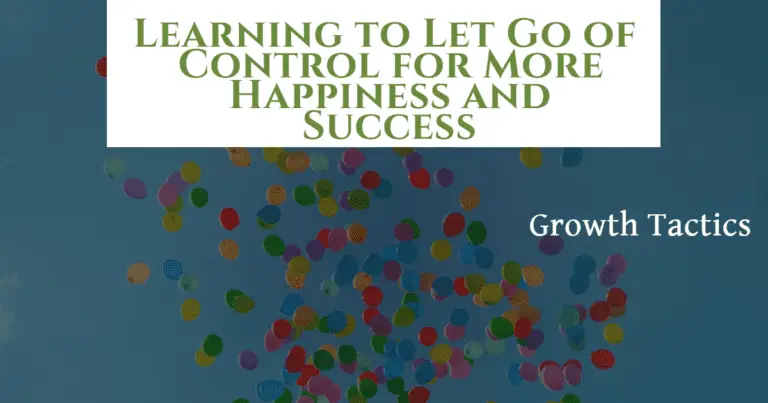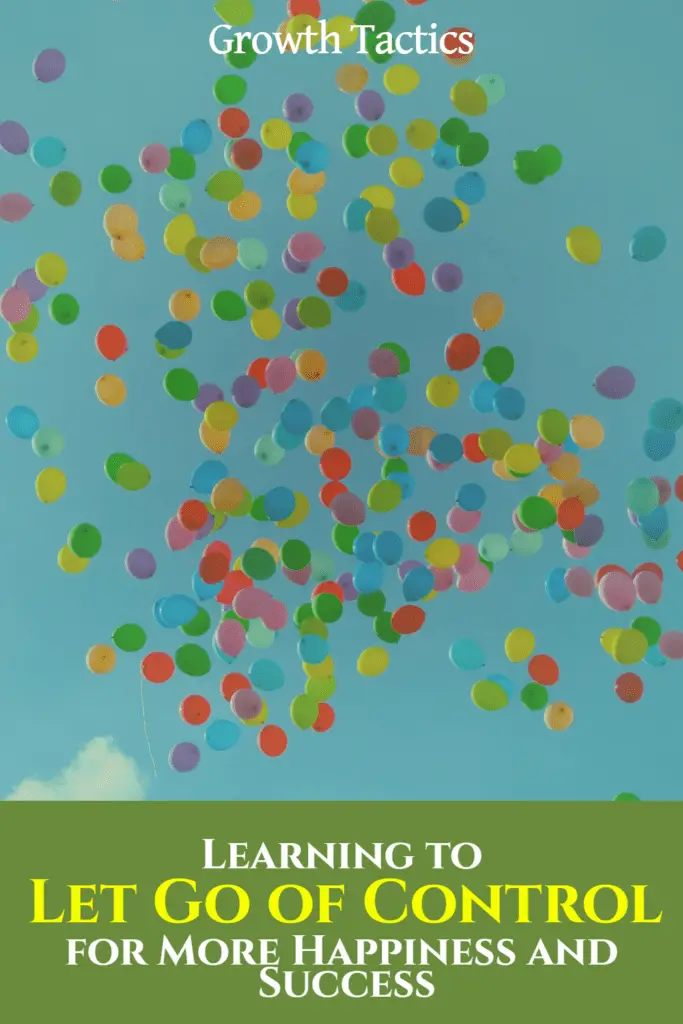Are you constantly striving to control every aspect of your life? Do you find yourself feeling stressed, anxious, and frustrated when things don’t go according to plan? It’s time to break free from the grip of control and discover a path to greater happiness and success.
In this article, we will explore the transformative power of letting go, surrendering to the present moment, and embracing mindfulness. Let go of the need to control and open yourself up to a world of possibilities.
Jump To Section
The Illusion of Control
When we try to control every aspect of our lives, we fall into the illusion that we have power over everything. We believe that by meticulously planning and exerting our will, we can create a sense of security and certainty. However, in reality, this need for control often leads to added stress, disappointment, and missed opportunities for growth.
Trying to control everything is like grasping at sand – the tighter we hold on, the more it slips through our fingers. Life is unpredictable, and there are countless external factors beyond our control. By clinging to the belief that we can control everything, we set ourselves up for constant frustration and a constant battle against life’s natural ebb and flow.
Moreover, the need for control robs us of being fully present in the moment. We become so focused on planning for the future or trying to manipulate outcomes that we miss out on the richness and beauty of the present moment. Life becomes a series of checkboxes and to-do lists, rather than a journey of exploration and authentic experiences.
In order to break free from this illusion, we must learn to let go, surrender, and find harmony within the unpredictability of life. Instead of trying to control everything, we can cultivate a mindset of openness and acceptance, embracing the present moment as it unfolds. Letting go of the need for control is not a sign of weakness, but a powerful act of self-awareness and self-mastery.
In the following sections, we will delve deeper into the practices of mindfulness and present moment awareness, exploring how they can help us let go of control and find greater happiness and success in our lives. Get ready to embark on a journey of self-discovery and liberation from the burden of control.
The Power of Mindfulness
One of the most effective tools we can use to let go of control is mindfulness. Mindfulness is the practice of being fully present and engaged in the current moment, without judgment or distraction. By cultivating mindfulness, we can learn to observe our thoughts and emotions without getting caught up in them, and develop a deeper sense of inner peace and clarity.
Moreover, mindfulness can help us become aware of our need for control, and allow us to let go of it. By observing our thoughts as they arise, we can learn to notice patterns and habits that keep us stuck in a cycle of control. We can then begin to challenge these patterns and habits, and start opening up to a more flexible and accepting mindset.
For example, if we notice that we are constantly worrying about outcomes and trying to control every possible scenario, we can pause and reflect on whether this is truly serving us. We might ask ourselves, “Am I happier when I’m obsessing over every detail, or when I’m simply allowing things to unfold?” By shifting our focus from control to presence, we can develop a greater sense of inner peace and happiness, and free ourselves from unnecessary stress and anxiety.
Mindfulness can take many forms, from focused breathing exercises to mindful movement practices like yoga or tai chi. By incorporating even a few minutes of mindfulness practice into our daily routine, we can begin to retrain our minds to let go of control and embrace the present moment. In doing so, we open up a world of possibility and potential and find greater happiness and success in every aspect of our lives.
Embracing Uncertainty
One of the key challenges in letting go of control is learning to embrace uncertainty. Uncertainty is an inherent part of life, and no matter how much we try to control or predict outcomes, there will always be elements beyond our control. Instead of resisting and fearing uncertainty, we can choose to embrace it as a natural part of the human experience.
Embracing uncertainty allows us to open ourselves up to new possibilities and opportunities. When we let go of rigid expectations and step into the unknown, we create space for spontaneity, creativity, and growth. We become more adaptable, resilient, and better equipped to navigate the ever-changing landscape of life.
To embrace uncertainty, it is important to cultivate a mindset of curiosity and courage. Rather than seeing uncertainty as a threat, we can view it as an invitation to explore and discover. We can approach challenges and unexpected changes with an attitude of openness, knowing that they hold the potential for personal growth and transformation.
Practicing gratitude can also help us embrace uncertainty. By focusing on the present moment and appreciating what we have, we develop a sense of contentment and trust in the process of life. Gratitude allows us to shift our perspective from what is lacking to what is abundant, fostering a sense of acceptance and peace.
In addition, building a support network of trusted individuals can provide a sense of security and comfort during uncertain times. Surrounding ourselves with people who offer support, guidance, and different perspectives can help us navigate uncertainty with greater clarity and resilience.
By embracing uncertainty, we release the need for control and open ourselves up to a deeper sense of trust in ourselves and the universe. We learn to let go of the illusion of control and find freedom in surrendering to the flow of life. Embracing uncertainty becomes not only a mindset shift but also a pathway to personal growth, fulfillment, and a richer human experience.
Practical Strategies for Letting Go of Control
While letting go of control is a mindset shift, it can also be helpful to have practical strategies to implement in daily life. Here are some strategies that can support you in letting go of control:
-
Practice self-awareness: Take time to observe your thoughts, emotions, and behaviors related to control. Notice when you feel the urge to control and reflect on the underlying fears or beliefs driving that need.
-
Acceptance of the present moment: Cultivate acceptance of the present moment, including the things you cannot control. Recognize that there will always be variables outside of your influence and that acceptance allows you to find peace and focus on what you can control.
-
Set clear intentions: Instead of trying to control every outcome, set clear intentions and take aligned action. Trust that your intentions will guide you towards positive outcomes, while remaining open to detours and unexpected opportunities.
-
Practice letting go: Engage in activities that deliberately encourage letting go, such as meditation, writing in a journal, or participating in hobbies that require surrender to the process. These activities help train your mind to release the need for control.
-
Seek support: Reach out to trusted friends, family, or professionals for support. Discussing your struggles with control and receiving guidance and perspective from others can be invaluable in gaining insights and finding ways to release control.
-
Practice self-care: Prioritize self-care activities that help you relax and reduce stress. Engaging in activities such as exercise, spending time in nature, practicing mindfulness, or engaging in hobbies can help you feel more grounded and less attached to controlling outcomes.
-
Reframe your perspective: Challenge your beliefs around control by reframing how you perceive situations. Instead of seeing uncertainty and lack of control as negatives, view them as opportunities for growth, learning, and adaptation.
By incorporating these strategies into your daily life, you can gradually let go of control and cultivate a greater sense of peace, acceptance, and resilience. Remember, letting go of control is a gradual process, so be patient and gentle with yourself as you navigate this journey toward a more fulfilling and balanced life.
Section: Benefits of Letting Go of Control
Letting go of control can have numerous positive effects on various aspects of our lives. Here are some key benefits of embracing a mindset of surrender and releasing the need for control:
-
Reduced stress and anxiety: Trying to control every aspect of our lives can cause immense stress and anxiety. By letting go of control, we free ourselves from the constant pressure of trying to manage and manipulate outcomes. This leads to a greater sense of calm, peace, and overall well-being.
-
Improved relationships: When we let go of control, we allow others to be themselves and honor their autonomy. This fosters healthier relationships based on trust, respect, and open communication. By relinquishing control, we create space for deeper connections and more meaningful interactions.
-
Increased adaptability: Embracing uncertainty and releasing the need for control enhances our ability to adapt to change. When we are flexible and open-minded, we can navigate unexpected situations with greater ease and resilience. This adaptability allows us to respond to challenges more effectively and find alternative solutions.
-
Enhanced creativity and innovation: Letting go of control encourages a more curious and open mindset. By embracing uncertainty, we free ourselves from rigid thinking patterns and allow room for creativity and innovation to flourish. This can lead to fresh ideas, new perspectives, and breakthroughs in various areas of life, including personal and professional endeavors.
-
Greater self-acceptance and self-compassion: Trying to control everything can stem from a fear of failure or a need for external validation. By letting go of control, we shift our focus inward and cultivate self-acceptance and self-compassion. We learn to embrace our imperfections and trust in our innate abilities, leading to greater self-confidence and a deeper sense of self-worth.
-
Enhanced personal growth and learning: Letting go of control opens us up to new experiences, challenges, and opportunities. It allows us to step outside our comfort zones and embrace growth-oriented mindsets. When we release the need for control, we become more open to learning, self-discovery, and personal transformation.
-
Improved overall well-being: By learning to let go of control, we can experience a sense of freedom, liberation, and inner peace. When we acknowledge that we cannot control everything, we release unnecessary burdens and allow ourselves to fully embrace the present moment. This leads to improved overall well-being, increased happiness, and a greater sense of fulfillment.
By embracing the benefits of letting go of control, we can create a more harmonious and fulfilling life. Letting go does not mean relinquishing responsibility or being passive; rather, it is about finding a balance between our efforts and surrendering to the natural flow of life. It is an ongoing practice that can lead to profound personal growth and a deeper connection to ourselves and the world around us.


